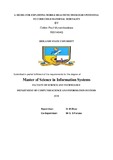Please use this identifier to cite or link to this item:
https://cris.library.msu.ac.zw//handle/11408/3548| Title: | A model for exploiting mobile health technologies potential to curb child maternal mortality | Authors: | Mupandasekwa, Collen Paul | Keywords: | Maternal-care delivery system Health-care system |
Issue Date: | 2018 | Publisher: | Midlands State University | Abstract: | Zimbabwe has a fairly developed maternal-care delivery system that is served by public and private hospitals at district, provincial and national level. The public health-care system is the largest provider of maternal-care services and caters for the majority of the population but this is done in a resource-restricted context, typical of a developing context. In this context, this research sought to establish the potential of Mobile Health Technologies in Zimbabwe’s maternal health sector using Parirenyatwa and Harare hospitals as case studies. The reviewed body of knowledge, which was largely a comparative assessment of mHealth technology adoption in developing countries, indicated that the full adoption of the prevailing eHealth strategy in Zimbabwe remains hamstrung by the slow pace of policy implementation. This is a qualitative study and data was collected with unstructured interviews. Purposive and snowball sampling were used to recruit the participants. The gathered data was analysed through content and thematic analysis. Four broad themes emerged from the primary data collected during the interviews and these include: trends in information dissemination in Zimbabwe’s Public Health System; information needs for expectant women and midwives; the prevalence of ICT use in Zimbabwe’s Public Health System, and mobile technology use in the maternal health sector in Zimbabwe. The research was able to establish that while there is a high proliferation of smartphone use among most expectant women, this has not translated into their use for maternal information-related purposes. Furthermore, the situation is not helped by the over-emphasis on internal ICT adoption by health centers rather than a patient-centric approach to ICT use. A limitation for this study was its focus on two hospitals which means its findings cannot be taken as a conclusive reflection of Zimbabwe’s entire maternal health sector. The research was able to conclude that hospitals need to become perpetual learning organizations on mHealth technology use. | URI: | http://hdl.handle.net/11408/3548 |
| Appears in Collections: | Master Of Science In Information Systems Management |
Files in This Item:
| File | Description | Size | Format | |
|---|---|---|---|---|
| combined Dissertation.pdf | Full Text | 988.11 kB | Adobe PDF |  View/Open |
Page view(s)
302
checked on Feb 9, 2026
Download(s)
200
checked on Feb 9, 2026
Google ScholarTM
Check
Items in MSUIR are protected by copyright, with all rights reserved, unless otherwise indicated.



